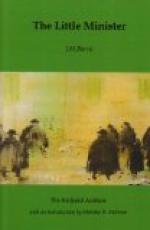“There’s to be a prayer-meeting for rain in the Auld Licit kirk the night,” he told me as I escorted him as far as my side of the Quharity, now almost a dead stream, pitiable to see, “and I’m gaen; though I’m sweer to leave thae puir cattle o’ mine. You should see how they look at me when I gie them mair o’ that rotten grass to eat. It’s eneuch to mak a man greet, for what richt hae I to keep kye when I canna meat them?”
Waster Lunny has said to me more than once that the great surprise of his life was when Elspeth was willing to take him. Many a time, however, I have seen that in him which might have made any weaver’s daughter proud of such a man, and I saw it again when we came to the river side.
“I’m no ane o’ thae farmers,” he said, truthfully, “that’s aye girding at the weather, and Elspeth and me kens that we hae been dealt wi’ bountifully since we took this farm wi’ gey anxious hearts. That woman, dominie, is eneuch to put a brave face on a coward, and it’s no langer syne than yestreen when I was sitting in the dumps, looking at the aurora borealis, which I canna but regard as a messenger o’ woe, that she put her hand on my shoulder and she says, ’Waster Lunny, twenty year syne we began life thegither wi’ nothing but the claethes on our back, and an it please God we can begin it again, for I hae you and you hae me, and I’m no cast down if you’re no.’ Dominie, is there mony sic women in the warld as that?”
“Many a one,” I said.
“Ay, man, it shamed me, for I hae a kind o’ delight in angering Elspeth, just to see what she’ll say. I could hae ta’en her on my knee at that minute, but the bairns was there, and so it wouldna hae dune. But I cheered her up, for, after all, the drought canna put us so far back as we was twenty years syne, unless it’s true what my father said, that the aurora borealis is the devil’s rainbow. I saw it sax times in July month, and it made me shut my een. You was out admiring it, dominie, but I can never forget that it was seen in the year twelve just afore the great storm. I was only a laddie then, but I mind how that awful wind stripped a’ the standing corn in the glen in less time than we’ve been here at the water’s edge. It was called the deil’s besom. My father’s hinmost words to me was, ’It’s time eneuch to greet, laddie, when you see the aurora borealis.’ I mind he was so complete ruined in an hour that he had to apply for relief frae the poor’s rates. Think o’ that, and him a proud man. He would tak’ nothing till one winter day when we was a’ starving, and syne I gaed wi’ him to speir for’t, and he telled me to grip his hand ticht, so that the cauldness o’ mine micht gie him courage. They were doling out the charity in the Town’s House, and I had never been in’t afore. I canna look at it now without thinking o’ that day when me and my father gaed up the stair thegither. Mr. Duthie was presiding at the time, and he wasna muckle older than Mr. Dishart is now. I mind




